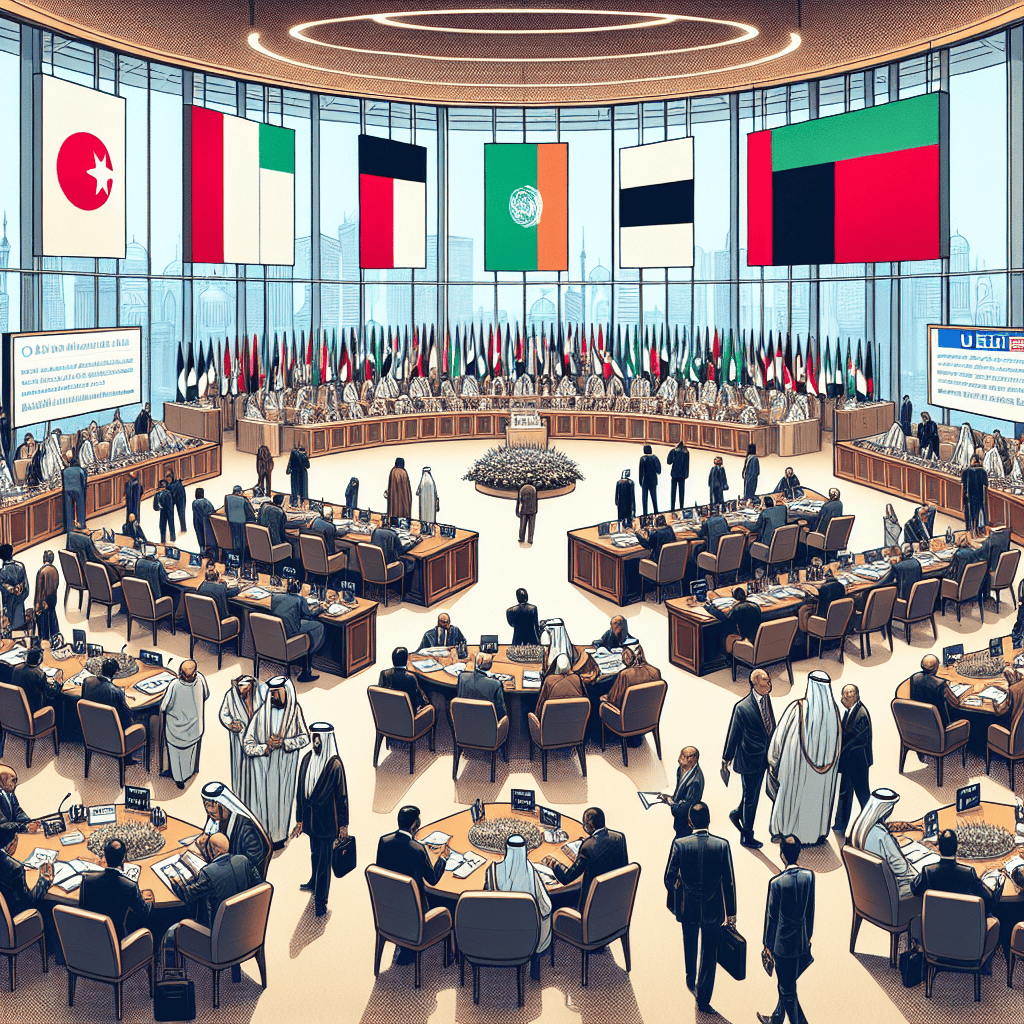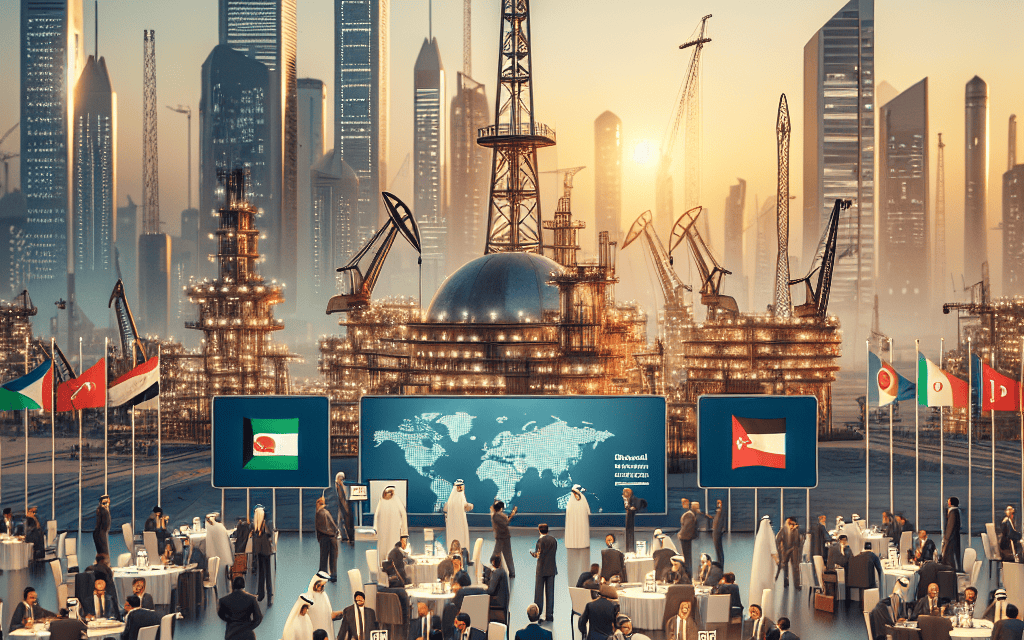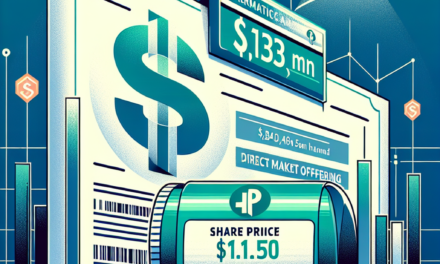“Navigating Energy Futures: UAE Leads Amidst Regional Tensions and Global Political Shifts”
Introduction
The United Arab Emirates has commenced its annual oil and gas summit, a pivotal event that gathers industry leaders, policymakers, and stakeholders to discuss the future of energy in a rapidly evolving global landscape. This year’s summit unfolds against a backdrop of heightened geopolitical tensions in the Middle East and the looming anticipation of the United States presidential election, both of which have significant implications for the global energy market. As the UAE seeks to assert its role as a key player in the energy sector, the summit serves as a platform for addressing challenges, exploring innovative solutions, and fostering international collaboration to ensure energy security and sustainability in an uncertain world.
Impact Of Mideast Conflicts On UAE’s Oil And Gas Industry
The United Arab Emirates (UAE) has long been a pivotal player in the global oil and gas industry, and the annual Oil and Gas Summit serves as a crucial platform for discussing the sector’s future. This year, the summit unfolds against a backdrop of heightened geopolitical tensions in the Middle East and the looming anticipation of the United States presidential election. These factors collectively cast a shadow over the proceedings, prompting industry leaders to assess their potential impact on the UAE’s oil and gas industry.
To begin with, the ongoing conflicts in the Middle East have historically influenced oil prices and production levels, and the current situation is no exception. The region’s geopolitical instability often leads to fluctuations in oil supply, which in turn affects global prices. For the UAE, a nation heavily reliant on oil exports, these fluctuations can have significant economic implications. The uncertainty surrounding the stability of neighboring countries can disrupt supply chains and pose risks to infrastructure, necessitating a strategic approach to ensure the security and continuity of oil production and exportation.
Moreover, the UAE’s strategic location in the Persian Gulf makes it a critical hub for global energy trade. However, this proximity to conflict zones also means that any escalation in regional tensions could directly impact its oil and gas operations. The potential for disruptions in shipping routes, such as the Strait of Hormuz, through which a significant portion of the world’s oil passes, underscores the importance of maintaining diplomatic relations and ensuring maritime security. Consequently, the UAE is likely to emphasize the need for regional cooperation and dialogue to mitigate these risks during the summit.
In addition to regional conflicts, the anticipation of the US presidential election adds another layer of complexity to the UAE’s oil and gas strategy. The outcome of the election could lead to shifts in US foreign policy, particularly regarding sanctions on oil-producing countries and climate change initiatives. A change in administration might result in a reevaluation of the US’s stance on Middle Eastern geopolitics, potentially affecting the UAE’s trade relationships and energy policies. As such, the summit provides an opportunity for UAE officials and industry leaders to discuss potential scenarios and develop contingency plans to adapt to any changes in the global political landscape.
Furthermore, the UAE is increasingly aware of the need to diversify its economy and reduce its dependence on oil revenues. The current geopolitical climate serves as a reminder of the vulnerabilities associated with an oil-centric economy. As a result, the summit is expected to highlight the importance of investing in renewable energy sources and advancing technological innovations within the oil and gas sector. By doing so, the UAE aims to position itself as a leader in sustainable energy while maintaining its status as a major oil producer.
In conclusion, the UAE’s annual Oil and Gas Summit takes place at a critical juncture, with Middle Eastern conflicts and the US election creating an environment of uncertainty. The discussions at the summit will likely focus on strategies to navigate these challenges, emphasizing the need for regional stability, diplomatic engagement, and economic diversification. As the UAE continues to play a central role in the global energy market, its ability to adapt to these evolving dynamics will be crucial in shaping the future of its oil and gas industry.
UAE’s Strategic Role In Global Energy Amid US Election Uncertainty
The United Arab Emirates (UAE) has once again taken center stage in the global energy sector as it inaugurates its annual Oil and Gas Summit. This event comes at a time when the Middle East is grappling with ongoing conflicts, and the world is closely watching the unfolding political landscape in the United States as the presidential election approaches. The UAE’s strategic role in the global energy market is underscored by its ability to navigate these complex geopolitical dynamics while maintaining its position as a key player in the industry.
As the summit commences, the UAE is poised to address the challenges and opportunities that arise from the current geopolitical climate. The Middle East, a region historically marked by its rich energy resources, continues to face instability due to various conflicts. These tensions have the potential to disrupt oil and gas supplies, thereby affecting global markets. However, the UAE has consistently demonstrated its resilience and adaptability, leveraging its strategic location and robust infrastructure to ensure a steady flow of energy resources to the world.
In addition to regional conflicts, the upcoming U.S. presidential election adds another layer of uncertainty to the global energy landscape. The policies of the next U.S. administration could significantly impact international energy markets, particularly in terms of trade relations, environmental regulations, and energy independence strategies. The UAE, with its strong diplomatic ties to the United States, is keenly aware of these potential shifts and is preparing to adapt its strategies accordingly. By fostering dialogue and collaboration at the summit, the UAE aims to strengthen its partnerships and ensure stability in the energy sector.
Moreover, the UAE’s commitment to diversifying its energy portfolio is evident in its investments in renewable energy sources. While oil and gas remain central to its economy, the nation is actively pursuing sustainable energy solutions to reduce its carbon footprint and align with global environmental goals. This forward-thinking approach not only enhances the UAE’s energy security but also positions it as a leader in the transition to a more sustainable energy future. The summit provides a platform for the UAE to showcase its advancements in this area and to encourage international cooperation in achieving shared sustainability objectives.
Furthermore, the UAE’s strategic role extends beyond its energy production capabilities. As a hub for innovation and technology, the nation is at the forefront of developing cutting-edge solutions to enhance energy efficiency and reduce emissions. By investing in research and development, the UAE is driving progress in areas such as carbon capture and storage, smart grid technologies, and energy storage systems. These innovations are crucial for addressing the dual challenges of meeting global energy demand while mitigating the impacts of climate change.
In conclusion, the UAE’s annual Oil and Gas Summit serves as a critical forum for addressing the complex interplay of geopolitical, economic, and environmental factors shaping the global energy landscape. Amid Middle East conflicts and U.S. election anticipation, the UAE’s strategic role is underscored by its ability to adapt and lead in an ever-evolving industry. Through collaboration, innovation, and a commitment to sustainability, the UAE is poised to navigate these challenges and continue its legacy as a pivotal player in the global energy market.
Innovations In UAE’s Oil And Gas Sector During Geopolitical Tensions
The United Arab Emirates (UAE) has long been a pivotal player in the global oil and gas industry, and its annual summit serves as a crucial platform for discussing innovations and strategies in the sector. This year, the summit unfolds against a backdrop of heightened geopolitical tensions in the Middle East and the looming anticipation of the United States presidential election. These factors inevitably influence the dynamics of the oil and gas markets, prompting the UAE to adapt and innovate in response to these challenges.
In recent years, the UAE has made significant strides in integrating advanced technologies into its oil and gas operations. The adoption of digital solutions, such as artificial intelligence and machine learning, has enabled the sector to enhance efficiency and reduce operational costs. These technologies facilitate predictive maintenance, optimize production processes, and improve decision-making capabilities. As geopolitical tensions threaten to disrupt supply chains and market stability, the UAE’s focus on technological innovation provides a buffer against potential adversities.
Moreover, the UAE is investing heavily in sustainable energy practices, recognizing the global shift towards cleaner energy sources. The nation is committed to reducing its carbon footprint and has set ambitious targets to increase the share of renewable energy in its energy mix. This commitment is evident in projects like the Al Dhafra Solar Project, which, upon completion, will be one of the largest solar power plants in the world. By diversifying its energy portfolio, the UAE not only addresses environmental concerns but also mitigates the risks associated with fluctuating oil prices and geopolitical uncertainties.
In addition to technological advancements and sustainability efforts, the UAE is strengthening its international partnerships to bolster its oil and gas sector. Collaborations with global energy giants and technology firms have facilitated knowledge exchange and fostered innovation. These partnerships are particularly crucial in times of geopolitical tension, as they provide the UAE with access to cutting-edge technologies and expertise that enhance its resilience in a volatile market.
The anticipation of the US presidential election adds another layer of complexity to the global oil and gas landscape. The outcome of the election could significantly impact US foreign policy, trade relations, and energy strategies, all of which have direct implications for the UAE. In this context, the UAE is closely monitoring the political developments in the US, preparing to adjust its strategies accordingly. By maintaining a flexible and adaptive approach, the UAE aims to navigate the uncertainties of the international political arena while safeguarding its economic interests.
Furthermore, the UAE’s commitment to innovation extends to its workforce development initiatives. Recognizing the importance of human capital in driving technological advancements, the nation is investing in education and training programs to equip its workforce with the necessary skills for the digital age. These initiatives ensure that the UAE remains at the forefront of innovation in the oil and gas sector, even amid geopolitical tensions.
In conclusion, the UAE’s annual oil and gas summit highlights the nation’s proactive approach to addressing the challenges posed by geopolitical tensions and the anticipated US election. Through technological innovation, sustainable energy practices, international partnerships, and workforce development, the UAE is positioning itself as a resilient and forward-thinking leader in the global energy market. As the world continues to grapple with uncertainty, the UAE’s strategic initiatives serve as a testament to its commitment to innovation and adaptability in the face of adversity.
How UAE Balances Energy Diplomacy And Regional Stability

The United Arab Emirates (UAE) has long been a pivotal player in the global energy sector, leveraging its substantial oil and gas reserves to exert influence on both regional and international stages. As the UAE kicks off its annual Oil and Gas Summit, the nation finds itself navigating a complex landscape marked by ongoing Middle Eastern conflicts and the anticipation of the upcoming United States presidential election. These factors present both challenges and opportunities for the UAE as it seeks to balance energy diplomacy with regional stability.
In recent years, the UAE has demonstrated a keen ability to adapt its energy strategies to the shifting geopolitical environment. The nation has consistently positioned itself as a reliable energy supplier, fostering partnerships with countries across the globe. This approach not only enhances its economic prospects but also strengthens its diplomatic ties. However, the current geopolitical climate requires the UAE to tread carefully, as regional tensions and global political shifts could impact its energy diplomacy.
The Middle East remains a region fraught with conflict, with ongoing tensions in areas such as Yemen, Syria, and the broader Gulf region. These conflicts pose significant risks to energy infrastructure and supply chains, necessitating a strategic approach from the UAE. By engaging in diplomatic efforts and promoting dialogue among regional actors, the UAE aims to mitigate these risks and ensure the continued flow of energy resources. Moreover, the UAE’s commitment to regional stability is underscored by its participation in multilateral organizations and initiatives aimed at fostering peace and cooperation.
Simultaneously, the anticipation of the United States presidential election adds another layer of complexity to the UAE’s energy diplomacy. The outcome of the election could have profound implications for global energy markets, particularly in terms of U.S. foreign policy and its approach to the Middle East. The UAE must remain agile, ready to adjust its strategies in response to potential shifts in U.S. policy. This includes maintaining open channels of communication with both current and potential future U.S. administrations to safeguard its interests and ensure alignment on key issues.
In addition to navigating these geopolitical challenges, the UAE is also focused on advancing its energy transition agenda. Recognizing the global shift towards sustainable energy sources, the UAE has invested heavily in renewable energy projects and technologies. This commitment to sustainability not only enhances the nation’s energy security but also positions it as a leader in the global energy transition. By balancing its traditional oil and gas interests with a forward-looking approach to renewable energy, the UAE is well-positioned to maintain its influence in the evolving energy landscape.
Furthermore, the UAE’s efforts to balance energy diplomacy with regional stability are supported by its robust economic diversification strategy. By reducing its reliance on oil revenues and investing in sectors such as tourism, finance, and technology, the UAE is building a resilient economy capable of withstanding external shocks. This economic resilience, in turn, bolsters the nation’s ability to pursue its diplomatic objectives and contribute to regional stability.
In conclusion, as the UAE hosts its annual Oil and Gas Summit, it stands at a critical juncture in its energy diplomacy journey. By carefully navigating the challenges posed by Middle Eastern conflicts and the U.S. election, while simultaneously advancing its energy transition and economic diversification efforts, the UAE is poised to maintain its role as a key player in the global energy arena. Through strategic diplomacy and a commitment to regional stability, the UAE continues to demonstrate its capacity to adapt and thrive in an ever-changing geopolitical landscape.
Future Of Renewable Energy In UAE’s Oil-Dominated Economy
As the United Arab Emirates (UAE) inaugurates its annual Oil and Gas Summit, the focus on the future of renewable energy within its oil-dominated economy becomes increasingly pertinent. This year’s summit unfolds against a backdrop of heightened geopolitical tensions in the Middle East and the anticipation of the upcoming United States presidential election, both of which have significant implications for global energy markets. Despite these challenges, the UAE remains steadfast in its commitment to diversifying its energy portfolio, recognizing the critical role that renewable energy will play in ensuring long-term economic stability and environmental sustainability.
The UAE’s strategic vision for energy diversification is encapsulated in its ambitious Energy Strategy 2050, which aims to increase the contribution of clean energy in the total energy mix to 50% by mid-century. This initiative underscores the nation’s proactive approach to reducing its carbon footprint while simultaneously addressing the growing global demand for sustainable energy solutions. The strategy is not merely a response to environmental concerns but also a calculated move to maintain the UAE’s competitive edge in a rapidly evolving energy landscape.
Transitioning from an oil-centric economy to one that embraces renewable energy sources presents both opportunities and challenges. On one hand, the UAE’s abundant solar resources offer a promising avenue for harnessing clean energy. The country has already made significant strides in this area, with projects like the Mohammed bin Rashid Al Maktoum Solar Park, which is set to become one of the largest solar power facilities in the world. Such initiatives not only contribute to the UAE’s renewable energy targets but also position the nation as a leader in solar technology innovation.
On the other hand, the integration of renewable energy into the existing infrastructure requires substantial investment and technological advancement. The UAE is actively investing in research and development to overcome these hurdles, fostering partnerships with international organizations and private sector entities to drive innovation. Moreover, the government is implementing policies to incentivize the adoption of renewable energy, such as subsidies and tax breaks for clean energy projects, which are crucial for attracting investment and accelerating the transition.
Furthermore, the geopolitical dynamics of the Middle East add another layer of complexity to the UAE’s energy strategy. Regional conflicts can disrupt energy supply chains and impact market stability, making it imperative for the UAE to enhance its energy security through diversification. By reducing its reliance on oil exports and increasing its renewable energy capacity, the UAE aims to mitigate the risks associated with geopolitical volatility and ensure a more resilient energy sector.
In addition to regional considerations, the global political climate, particularly the outcome of the US presidential election, could influence the UAE’s energy policies. The US plays a pivotal role in shaping international energy markets, and shifts in its energy policy could have far-reaching effects. The UAE is keenly aware of these dynamics and is positioning itself to adapt to potential changes in global energy governance.
In conclusion, the UAE’s pursuit of renewable energy within its oil-dominated economy is a testament to its forward-thinking approach and commitment to sustainable development. By leveraging its natural resources, investing in innovation, and navigating geopolitical challenges, the UAE is poised to transform its energy sector and set a benchmark for other oil-dependent nations. As the world watches the unfolding events in the Middle East and the US, the UAE’s strategic energy initiatives will undoubtedly play a crucial role in shaping the future of global energy.
UAE’s Energy Policies In The Context Of Global Political Shifts
The United Arab Emirates (UAE) has commenced its annual Oil and Gas Summit, a pivotal event that draws attention from industry leaders and policymakers worldwide. This year’s summit unfolds against a backdrop of significant geopolitical tensions in the Middle East and the looming anticipation of the United States presidential election. These factors collectively shape the discourse on energy policies, underscoring the UAE’s strategic positioning in the global energy landscape.
As a leading oil producer, the UAE plays a crucial role in the global energy market. Its policies not only influence regional dynamics but also have far-reaching implications for international energy security. The ongoing conflicts in the Middle East, particularly in areas like Syria and Yemen, have heightened concerns over the stability of oil supplies. In this context, the UAE’s commitment to maintaining a steady flow of oil is of paramount importance. The nation has consistently advocated for stability and security in the region, emphasizing the need for diplomatic solutions to conflicts that threaten energy infrastructure and supply chains.
Simultaneously, the anticipation of the US presidential election adds another layer of complexity to the global energy equation. The outcome of the election could significantly alter US foreign policy, particularly in relation to the Middle East. Historically, US administrations have varied in their approach to energy independence and international alliances, which in turn affects global oil prices and production strategies. The UAE, therefore, remains vigilant, adapting its energy policies to align with potential shifts in US policy. This adaptability is crucial for maintaining its influence and ensuring the resilience of its energy sector.
Moreover, the UAE’s energy policies are increasingly shaped by the global push towards sustainability and renewable energy. While oil and gas remain central to its economy, the UAE has made substantial investments in renewable energy projects, such as solar and wind power. This diversification strategy not only addresses environmental concerns but also positions the UAE as a forward-thinking leader in the energy transition. By balancing traditional energy production with innovative renewable initiatives, the UAE aims to secure its economic future while contributing to global efforts to combat climate change.
In addition to these external factors, the UAE’s internal policies also play a significant role in shaping its energy landscape. The government has implemented various reforms to enhance efficiency and attract foreign investment in the energy sector. These reforms are designed to foster a competitive environment that encourages technological advancements and sustainable practices. By creating a conducive atmosphere for innovation, the UAE seeks to maintain its status as a hub for energy expertise and development.
Furthermore, the summit serves as a platform for dialogue and collaboration among key stakeholders. It provides an opportunity for the UAE to showcase its achievements and share insights on best practices in energy management. Through these interactions, the UAE reinforces its commitment to international cooperation and knowledge exchange, which are essential for addressing the complex challenges facing the global energy sector.
In conclusion, the UAE’s annual Oil and Gas Summit is a critical event that highlights the nation’s strategic approach to energy policies amid global political shifts. By navigating the intricacies of Middle Eastern conflicts and anticipating changes in US policy, the UAE demonstrates its resilience and adaptability. Simultaneously, its focus on sustainability and innovation underscores its dedication to a balanced and forward-looking energy strategy. As the world grapples with evolving energy demands and geopolitical uncertainties, the UAE remains a pivotal player, shaping the future of energy on both regional and global scales.
The Role Of Technology In Enhancing UAE’s Oil And Gas Production
The United Arab Emirates (UAE) has long been a pivotal player in the global oil and gas industry, leveraging its vast reserves to fuel economic growth and development. As the nation inaugurates its annual Oil and Gas Summit, the focus intensifies on how technology can enhance production efficiency and sustainability, especially amid the backdrop of ongoing Middle Eastern conflicts and the anticipation of the upcoming US elections. These geopolitical dynamics underscore the importance of technological advancements in ensuring the UAE’s energy sector remains resilient and competitive.
In recent years, the UAE has embraced a forward-thinking approach, investing heavily in cutting-edge technologies to optimize its oil and gas operations. One of the most significant technological advancements is the implementation of digital oilfield technologies. These innovations integrate data analytics, artificial intelligence, and the Internet of Things (IoT) to provide real-time monitoring and predictive maintenance capabilities. By harnessing these tools, the UAE can significantly reduce operational costs, minimize downtime, and enhance the overall safety of its oil and gas infrastructure.
Moreover, the adoption of advanced drilling techniques, such as horizontal drilling and hydraulic fracturing, has enabled the UAE to access previously untapped reserves. These methods not only increase the efficiency of extraction processes but also extend the lifespan of existing oil fields. As a result, the UAE can maintain its production levels even as some of its older fields begin to decline. This strategic use of technology ensures that the nation remains a reliable supplier in the global energy market, even as it navigates the complexities of regional conflicts.
In addition to improving extraction and production processes, technology plays a crucial role in addressing environmental concerns associated with the oil and gas industry. The UAE is committed to reducing its carbon footprint and has implemented various initiatives to achieve this goal. Carbon capture and storage (CCS) technologies are at the forefront of these efforts, allowing the UAE to capture carbon emissions from industrial processes and store them underground. This not only mitigates the environmental impact of oil and gas production but also aligns with the UAE’s broader sustainability objectives.
Furthermore, the integration of renewable energy sources into the oil and gas sector is another area where technology is making a significant impact. The UAE has invested in solar and wind energy projects, which complement traditional energy sources and reduce reliance on fossil fuels. By incorporating renewable energy into its operations, the UAE is setting a precedent for other oil-producing nations to follow, demonstrating that economic growth and environmental stewardship can coexist.
As the world watches the unfolding geopolitical landscape, particularly with the US elections on the horizon, the UAE’s commitment to technological innovation in its oil and gas sector positions it as a leader in the industry. The ability to adapt and evolve in response to external pressures is a testament to the UAE’s strategic vision and dedication to maintaining its status as a key player in the global energy market.
In conclusion, technology is an indispensable tool in enhancing the UAE’s oil and gas production capabilities. By embracing digitalization, advanced drilling techniques, and sustainable practices, the UAE is not only securing its energy future but also contributing to a more sustainable global energy landscape. As the nation continues to navigate the challenges posed by regional conflicts and international political shifts, its focus on technological innovation will undoubtedly play a crucial role in shaping the future of its oil and gas industry.
Q&A
1. **What is the UAE Oil and Gas Summit?**
The UAE Oil and Gas Summit is an annual event where industry leaders, policymakers, and experts gather to discuss developments, challenges, and opportunities in the oil and gas sector.
2. **Why is the summit significant this year?**
This year’s summit is significant due to ongoing Middle East conflicts and the anticipation of the US elections, which could impact global oil markets and geopolitical dynamics.
3. **How do Middle East conflicts affect the oil and gas industry?**
Conflicts in the Middle East can disrupt oil supply chains, influence oil prices, and create uncertainty in global energy markets.
4. **What role does the UAE play in the global oil market?**
The UAE is a major oil producer and exporter, playing a crucial role in OPEC and influencing global oil supply and pricing.
5. **How might the US elections impact the oil and gas sector?**
US elections can lead to policy changes affecting energy production, environmental regulations, and international relations, impacting global oil markets.
6. **What are some key topics likely discussed at the summit?**
Key topics may include energy transition, sustainability, technological advancements, market volatility, and geopolitical risks.
7. **How is the UAE addressing sustainability in the oil and gas industry?**
The UAE is investing in renewable energy, implementing carbon reduction strategies, and promoting sustainable practices within the oil and gas sector.
Conclusion
The UAE’s annual oil and gas summit takes place against a backdrop of regional instability and global political uncertainty, particularly with ongoing Middle East conflicts and the anticipation of the US elections. These factors underscore the strategic importance of the summit as a platform for dialogue and decision-making in the energy sector. The event highlights the UAE’s role as a key player in the global energy market, navigating geopolitical challenges while seeking to balance energy security, economic interests, and sustainability goals. The outcomes of the summit could have significant implications for energy policies and market dynamics in the region and beyond.





